Esteemed experts convene to map out Cambodia’s circular textile future


Phnom Penh, Cambodia – 23 May 2023: Global Fashion Agenda (GFA), Deutsche Gesellschaft für Internationale Zusammenarbeit (GIZ) and Responsible Business Hub hosted by EuroCham, convened over 100 leading experts and stakeholders on 16 May to discuss the current state of textile waste in the country and establish the next steps towards a circular future .
The event, titled ‘Textile Waste Opportunities for Circular Textiles, Garments and Footwear in Cambodia’ ,served as an interactive platform to shed light on the topic of textile waste from the factories in Cambodia and discuss the options, solutions and opportunities for moving towards more circular approaches. It is estimated that the Cambodian textile, garment and footwear industry produces approximately 140,000 tonnes of textile waste per year1, most of which is handled by unregulated and unsustainable downcycling activities, burnt or disposed of in landfills – harming both the environment and the people.
The event marked the start of an active initiative to support the creation of circular systems in Cambodia by supporting a pilot project that can enable the proper sorting and recycling of textile waste and ultimately, divert waste from landfill or incineration. GFA and GIZ, are now engaging stakeholders for a Circular Fashion Partnership Cambodia as part of the Global Circular Fashion Forum (GCFF) which aims to spur local action in textile manufacturing countries to accelerate and scale recycling of post-industrial textile waste.
The engaged audience included representatives from manufacturers, brands, recyclers and recycling technologies, textile waste handlers and government, that collectively represent the Cambodian and global fashion and recycling industry . Attendees heard from 22 renowned speakers including H.E. Soem Nara, Under-Secretary of State at the Ministry of Industry, Science, Technology, and Innovation, H.E. Pak Sokharavuth, Under-Secretary of State, Ministry of Environment, Cambodia and representatives from United Nations Environment Programme, Fashion for Good, Crystal International Group, The Hong Kong Research Institute of Textiles and Apparel, TAFTAC (Textile, Apparel, Footwear and Travel Goods Association), Global Fashion Agenda, GIZ, EuroCham, PricewaterhouseCoopers Pvt. Ltd . and many more.
Speakers discussed the dissemination of recycling technology, business incentives, learnings and best practices from other countries, legislation, textile waste segregation, data, social considerations for a just transition to circularity and adapting solutions to the Cambodian context. The event also showcased a youth-led Cambodian fashion show, featuring upcycled designs.
Federica Marchionni, CEO, Global Fashion Agenda, said: “The overwhelming success of the GCFF event in Cambodia is a testament to the power of a shared vision. We at Global Fashion Agenda are eager to carry forward the momentum and learnings of this event as we begin to shape the Circular Fashion Partnership Cambodia project. A key learning from the event was the need to establish domestic sorting infrastructure in order to capture and valorise post-industrial textile waste, which is increasingly valuable to textile recyclers. Throughout this process we will work closely with our partners to ensure that we include all relevant actors and remain cognisant of the nuanced local context .”
Dr. Günter Riethmacher, Country Director, GIZ Cambodia, said, “Recycling of post-industrial textile waste is not reaching its full potential due to various challenges such as complex fabric compositions, sorting challenges and lack of local recycling capacities. The pilot project implemented by GIZ with GFA under the Circular Fashion Partnership will minimize the challenges and demonstrate that better solutions are feasible by bringing together all the stakeholders along the value chain. Addressing the textile waste will become an increasingly important sustainability topic for the entire sector .”
The Responsible Business Hub, hosted by EuroCham, said: “Responsible business is intrinsically linked to sustainability and circularity. Therefore, the RBH firmly supports any initiative aimed at recycling fabric waste within the country. The Updated Nationally Determined Contribution 2020 (NDC) for Cambodia, published by the Ministry of Environment (MOE), highlights the importance of a centralised recycling facility for industrial waste generated by the garment sector. This facility is a crucial part of Cambodia’s mitigation strategy. The RBH is committed to collaborating with relevant stakeholders such as the Ministry of Industry, Science, Technology, and Innovation (MISTI), as well as TAFTAC, to ensure the successful implementation of this project together with the private sector.”
The Circular Fashion Partnership Cambodia will first consist of a pilot project to establish and test effective textile sorting processes as well as explore the most relevant business models that benefit all actors. The pilot is currently being developed and the organisers are welcoming registrations of interest until 1 July 2023.
To register your interest in learning more about, and/or participating in the Circular Fashion Partnership phase one pilot in Cambodia, please contact: Shamiul Hoque, Impact Programme Manager, Global Fashion Agenda shamiul@globalfashionagenda.org and Kristin Sommer, Coordinator Environment, GIZ FABRIC, Kristin.sommer@giz.de